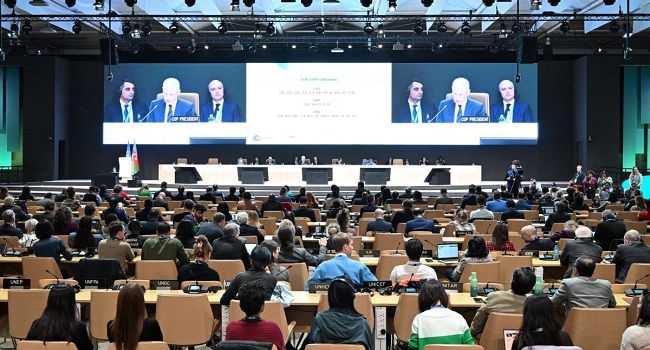Headlines
Global Leaders Secure $300 Billion Climate Finance Deal at COP29

The world achieves a landmark $300 billion climate finance agreement at COP29, focusing on sustainability and global cooperation.
On Sunday, the world reached consensus on a heavily debated climate deal. However, poorer countries that are most vulnerable to increasing disasters criticized a $300 billion annual pledge from affluent nations with histories of pollution as being insultingly inadequate.
Following two grueling weeks of intense negotiations and sleepless nights, nearly 200 nations hammered out a contentious finance agreement in a sports stadium in Azerbaijan.
However, the applause had hardly died down in Baku when India firmly rejected the recently agreed upon dollar amount.
“The proposed amount to be mobilized is extremely insufficient. It’s a meager sum,” stated Indian delegate Chandni Raina.
“This document is essentially an optical illusion. In our view, it will not tackle the vastness of the challenge we are all confronting.”
Nations faced challenges in resolving longstanding disagreements over how much financial support wealthy countries, which are most responsible for historic climate change, should offer to poorer nations that are least accountable but most affected by the rapid warming of the Earth.
EU climate envoy Wopke Hoekstra remarked that COP29 would be recognized as “the beginning of a new era for climate finance.”
Diplomats, exhausted from lack of sleep and gathered in tense groups, continued to revise the final wording on the plenary floor just hours before the deal was approved.
At times, the discussions seemed close to falling apart, as developing countries left meetings abruptly and warned they would withdraw if wealthier nations didn’t provide more financial support.
Ultimately, even though they repeatedly claimed that no deal was better than a bad one, they did not block the agreement, despite it being far from what they had hoped for.
The final agreement obligates developed nations to contribute a minimum of $300 billion annually by 2035, assisting developing countries in greening their economies and preparing for more severe disasters.
This amount, which is an increase from the existing pledge of $100 billion, was criticized by developing nations as being insultingly low compared to what they had demanded.
READ ALSO: UN Climate Talks ‘No Longer Fit for Purpose,’ Warn Key Experts
“This COP has been disastrous for the developing world,” stated Mohamed Adow, director of Power Shift Africa in Kenya.
“It’s a betrayal of both humanity and the environment by affluent nations that profess to take climate change seriously.”
A coalition of 134 developing nations advocated for a minimum of $500 billion from wealthy governments to enhance climate change resilience and reduce emissions of greenhouse gases that contribute to global warming.
UN climate chief Simon Stiell admitted that the agreement was not without flaws.
“No country achieved all of its goals, and we are departing Baku with a significant amount of work remaining. Therefore, this is not the moment for celebration,” he stated in a release.
The United States and the EU have been urging newly wealthy emerging economies, such as China—the world’s largest emitter—to contribute.
The final agreement “encourages” developing nations to voluntarily make contributions, maintaining the status quo for China, which already offers climate financing according to its own terms.
Affluent countries stated that anticipating additional direct government funding was politically impractical.
In January, Donald Trump, known for his skepticism towards climate change and foreign aid, returns to the White House amidst rising right-wing opposition to environmental policies in several other Western nations.
The agreement sets a broader annual goal of $1.3 trillion to address increasing temperatures and disasters, with the majority expected to come from private sources.
Wealthy countries and small island nations were also worried about Saudi Arabia’s attempts to weaken the commitments made at last year’s summit in Dubai to phase out fossil fuels.
The primary documents suggested in Baku did not specifically reference the Dubai commitment to “transitioning away from fossil fuels.”
Several countries accused Azerbaijan, an authoritarian oil and gas exporter, of lacking both the experience and determination to address current challenges as global temperatures reach new highs and deadly disasters become more frequent.
